Since 2022, the T.M.C. Asser Instituut, in collaboration with the Centre for Sport and Human Rights, is organising the first yearly summer course on the intersection of sport and human rights. This 4th edition brings together scholars specialised in the intersection between sport and human rights with professionals working in international sport to ensure respect for human rights. We will explore contemporary human rights challenges in sports, such as the protections of human rights at mega-sporting events, access to remedy in human rights cases within the world of sport, the intersection between human rights and gender rights in international sporting competitions, and many more.
The programme is designed to provide both deep background knowledge and actionnable insights, which will be relevant to a range of participants committed to defending human rights in international sport, including students, junior researchers, representatives of CSOs, sporting organisations, and athletes. It is structured around half days taking place online meant to accommodate as many participants as possible throughout the world.
Check out the latest draft programme below and register HERE!

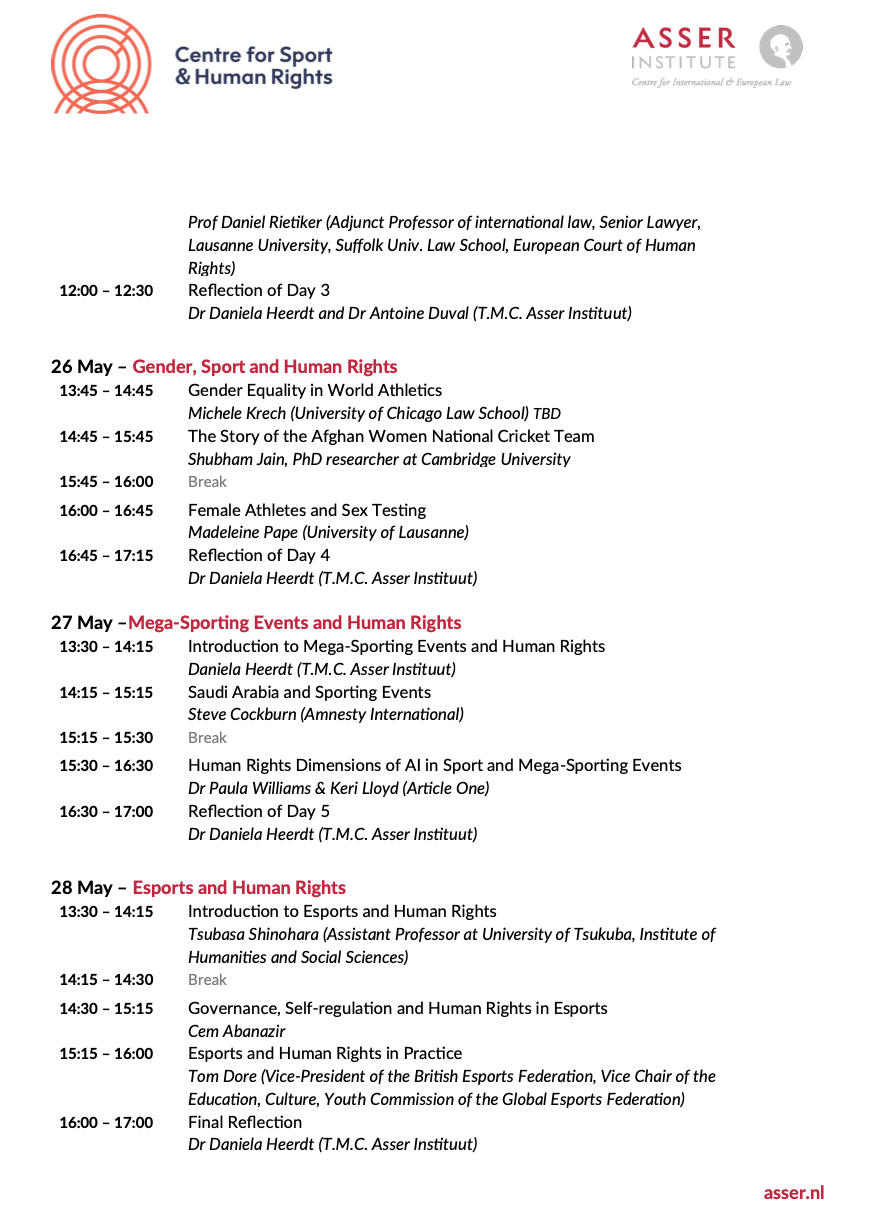
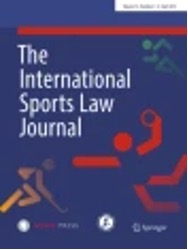


Call for papers
20 years of the World Anti-Doping Code in Action
International Sports Law Journal Conference 2025
Asser Institute, The Hague
6 and 7 November 2025
The Editors of the International Sports Law Journal (ISLJ), the Asser Institute and the Research Chair on Responsible Sport of the University of Sherbrooke invite you to submit abstracts for the ISLJ Conference on International Sports Law, which will take place on 6 and 7 November 2025 at the Asser Institute in The Hague. The ISLJ, published by Springer and T.M.C. Asser Press, is the leading academic publication in the field of international sports law and governance. The conference is a unique occasion to discuss the main legal issues affecting international sports with academics and practitioners from all around the world.
The 2025 ISLJ Conference will focus on assessing the first 20 years (2004-2024) of operation of the World Anti-Doping Code (WADC) since its entry into force in 2004, while also discussing its future prospects, in light of the new version of the Code due to be adopted at the Busan Conference in December 2025 and the 10th Conference of the Parties to the International Convention against Doping in Sport, to be held in Paris from 20 to 22 October. The aim of the conference will be to take a comprehensive stock of the operation of the private-public transnational regulatory regime which emerged in the wake of the WADC. This regime is structured around a complex network of national and global institutions engaged in anti-doping work (WADA, NADAs, Ifs, accredited laboratories) and guided by an equally complex assemblage of norms located at the global (WADC and the WADA Standards), international (UNESCO Convention against Doping in Sport), regional (Council of Europe Anti-Doping Convention), and national (various national anti-doping legislations) level. This makes for a fascinating and convoluted transnational legal construct in need of being studied, analysed and criticised by scholars.
Reviewing 20 years of implementation of the WADC warrants a special edition of the ISLJ Conference and of the journal, which invites scholars of all disciplines to reflect on the many questions and issues linked with it. We welcome proposals touching on the following subjects (and more):
- The governance of the world anti-doping regime
- The public-private nature of this governance
- The transparency of this governance
- The legitimacy of this governance
- The participatory nature of this governance
- The role of scientific experts in this governance
- The normative content of the WADC and the international standards
- The strict liability principle
- The privacy rights of athletes under the WADC
- The sanctioning policy under the WADC
- The role of the international standards in implementing the WADC
- The compatibility of the WADC with human rights
- The glocal implementation of the WADC
- The role of local institutions (NADOs/Labs/NOCs) in the implementation of the WADC
- The tension between global (WADA) and local (NADOs/Labs/NOCs) in the implementation of the WADC
- The role of the IFs in the implementation of the WADC
- The role of the ITA in the implementation of the WADC
- The role of judicial bodies (national courts, disciplinary committees of IFs, CAS) and their jurisprudence in the implementation of the WADC
- The effectiveness of the world anti-doping regime
- The evaluation and evolution of the effectiveness of the world anti-doping regime in preventing doping
- The role of the media in unveiling the ineffectiveness of the world anti-doping regime
- The role of states in hindering the effectiveness of the world anti-doping regime
- The world anti-doping regime as a regime with a variable geometry of effectiveness
- The future of the world anti-doping regime: Revolution, reform or more of the same?
- Do we need a world anti-doping regime?
- If we do, should it be reformed? How?
Abstracts of 300 words and CVs should be sent no later than 1 June 2025 to a.duval@asser.nl. Selected speakers will be informed by 30 June 2025. The selected participants will be expected to submit a draft paper by 15 October 2025. Papers accepted and presented at the conference are eligible for publication in a special issue of the ISLJ subject to peer-review. The Asser Institute will provide a limited amount of travel and accommodation grants (max. 350€) to early career researchers (doctoral and post-doctoral) in need of financial support. If you wish to be considered for a grant, please indicate it in your submission.
On 4 October, the Court of Justice of the European Union shook the world of football with its Diarra ruling. The decision questions the compatibility of a key provision of the FIFA Regulations on the Status and Transfer of Players (RSTP) with European Union internal market law. The RSTP, and in particular its article 17, are the bedrock of football’s transfer ‘market’ and regulate the conditions for the transnational movement of players between clubs. In 2023, based on FIFA’s numbers, 21 801 players were transferred internationally (of which 3279 with a fee) for transfer fees amounting to USD 9.63 bn. In short, this is a market that affects a considerable number of players and is linked with the movement of large sums of money between clubs and other actors (such as intermediaries).
Register HERE
Join us on 20 November from 16:00 to 18:00 CET to take stock of the ruling's impact and discuss the steps ahead in a free Zoom-In webinar in which there will be time for a Q&A session with the speakers. The ruling has already been much commented on (see here, here, here, and here), and this zoom-in webinar will be an opportunity for participants to engage with two experts on the economic and legal intricacies of the regulation of labour relations in football. We will mostly focus on the aftermath of the judgment and the question, 'what comes next?'
Moderator: Marjolaine Viret (Université de Lausanne)
Speakers:
Register HERE
The Court of Justice of the European Union has recently handed down its judgement in the Lassana Diarra case (C-650/22 FIFA v. BZ).
Given the importance of this case to the sports industry, LawInSport, the Asser Instituut and the Association for the Study of Sport and the EU (Sport & EU) are hosting a joint webinar to bring together experts to unpack and provide clarity on the complex legal, regulatory & commercial issues stemming from this case. This free webinar will be hosted from 14:00 UK time (15:00 CET) on 18 October 2024.
Register HERE
Speakers
Our expert speakers come from academia, law and sport. Our confirmed speakers are:
- Mario Flores Chemor, Head of Sports Legal, European Club Association
- Sinziana Ianc, Antitrust & Foreign Investment Managing Associate, Linklaters
- Carol Couse, Partner, Mills & Reeve
- Pieter Paepe, Partner, Edson Legal (represented FIFPRO & UNFP - French player’s association in this case)
- Dr. Andrea Cattaneo, Senior Lecturer in Law, Edge Hill University
- Dr. Antoine Duval, Senior Researcher, T.M.C. Asser Instituut
- Sean Cottrell, CEO, LawInSport (moderator)
Register HERE
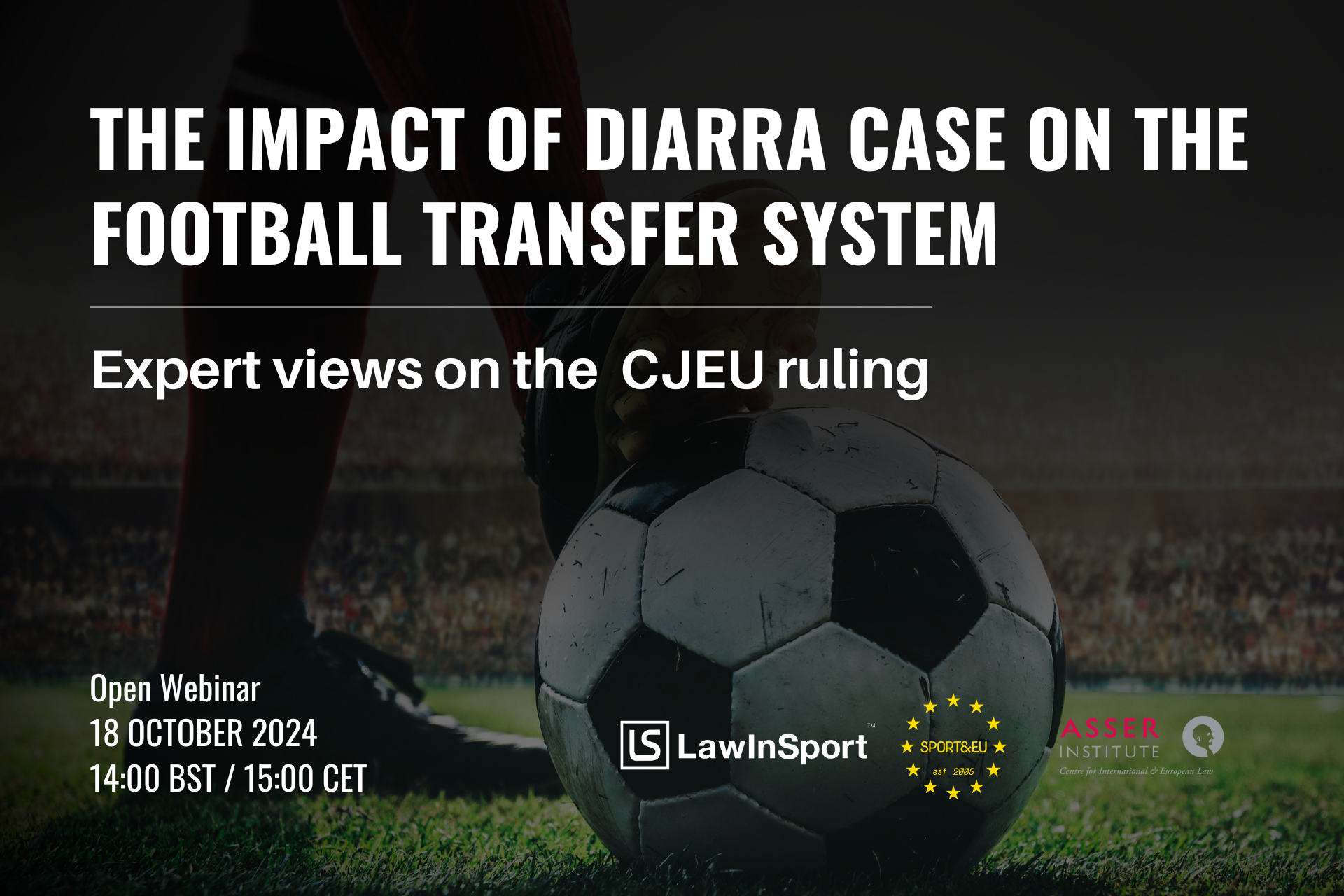
On 24 and 25 October 2024, the Asser Institute in The Hague will host the 2024 edition of the International Sports Law Journal (ISLJ) Conference. The ISLJ is the leading academic journal in transnational sports law and governance and is proud to provide a platform for transnational debates on the state of the field. The conference will address a number of issues of interest to the ISLJ and its readers.
Register HERE
Drivers and effects of reform in transnational sports governance
Transnational sports governance seems to be in a permanently unstable state of crisis and reform. At regular interval, international sports governing bodies face scandals triggered by corruption investigations or human rights violations, as well as adverse judidicial decisions. These are often followed by waves of institutional reforms, such as the creation of new bodies (E.g. the Athletics Integrity Unit), the adoption of new codes and regulation (such as Codes of Ethics) or human rights commitments (e.g. FIFA and the IOC’s Human Rights Policy/Strategy). This dynamic of crisis and reform will be at the heart of this year’s ISLJ conference, as a number of panels will critically investigate the triggers, transformative effects and limited impacts of reforms in transnational sports governance.
Football in the midst of international law and relations
As the war in Gaza and Russia’s invasion of Ukraine continue to rage, it has become even clearer that the football world can hardly be entirely abstracted from international relations. Yet, FIFA and UEFA continue to insist on their neutrality and to deny that their governance is (or should be) affected by the world’s political affairs. During the conference, we will engage with case studies in which football is entangled with international politics and law. In particular, the speakers will delve into the role of FIFA and UEFA in such situations and on the legal standards and processes that should be applied throughout their decision-making.
Olympic challenges of today and tomorrow
While the Paris 2024 Olympics have come to a close, the legal questions they have raised are far from exhausted. Instead, the Olympics have highlighted new issues (such as the question of the legality of the hijab ban imposed by the French Federation on its athletes) or old ones (such as the question whether Olympians should be remunerated by the IOC or the international federations), which will be discussed by our speakers. Finally, with the help of our keynote speaker, Prof. Jules Boykoff, a longstanding critique of the current Olympic regime, we will explore the IOC’s capacity to adapt to challenges while resisting radical change to the current model of olympism.
Download the full programme
Online participation available
Following the success of our webinar option in the past years, we are once again allowing online participation to the conference at an affordable price. Thus, we hope to internationalise and diversify our audience and to reach people who are not in a position to travel to The Hague.
We look forward to welcoming you in person in The Hague or digitally to this new iteration of the ISLJ conference.
Register HERE
Speakers
Register HERE
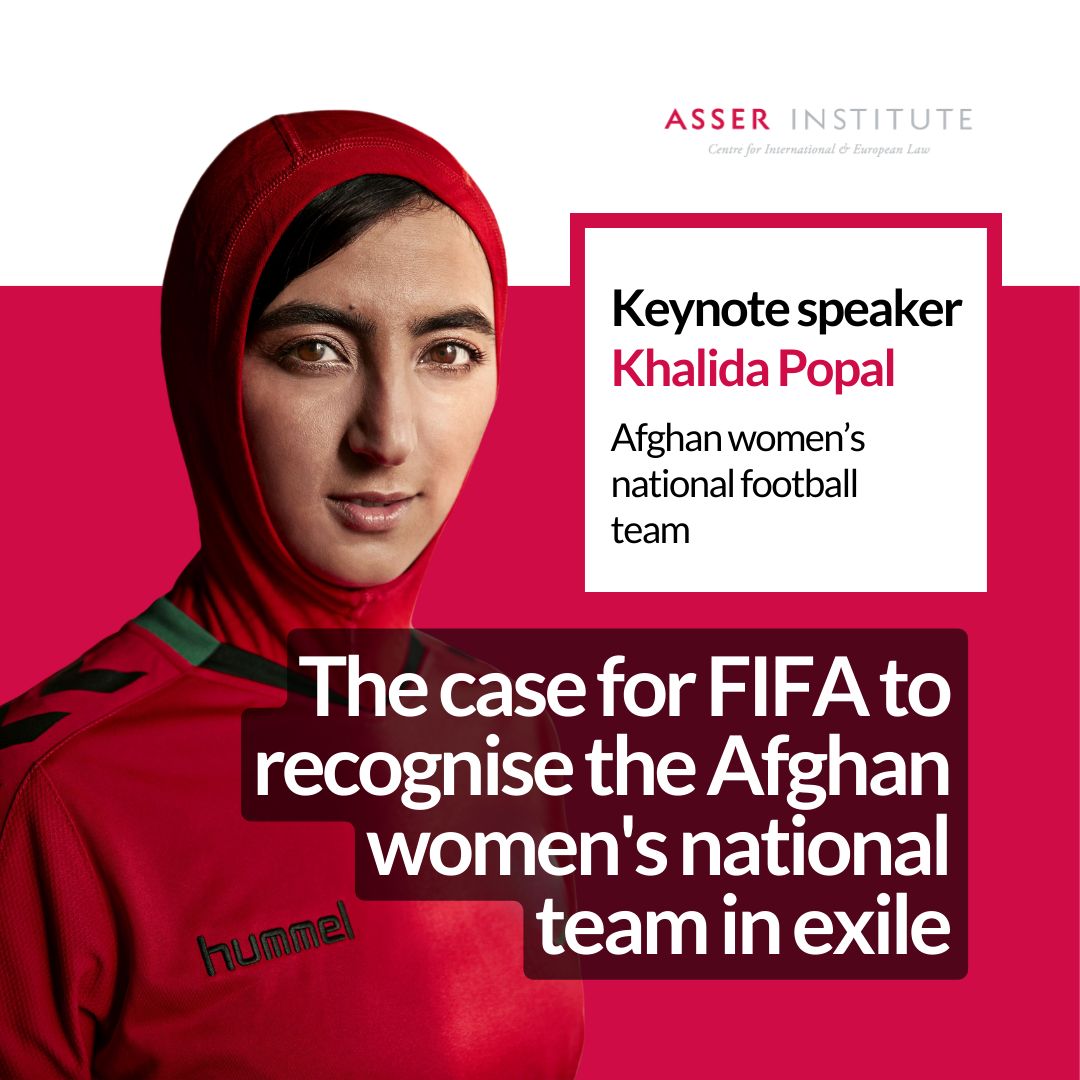
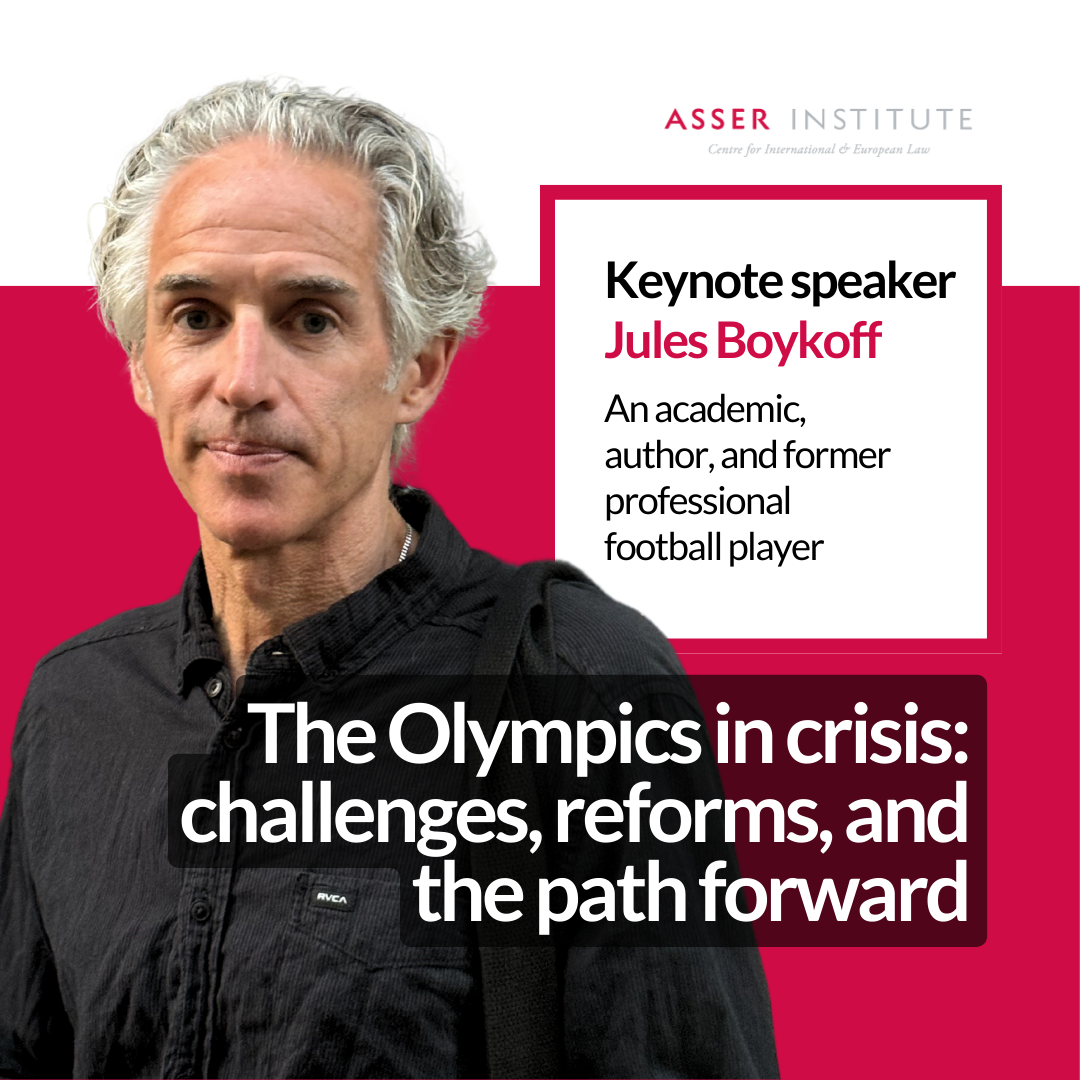
The newly launched ‘Global Sport and Human Rights Research Network’, an initiative jointly hosted by the T.M.C. Asser Instituut and the Centre for Sport and Human Rights, together with the European Union-funded project ‘Human Rights Empowered Through Athletes Rights (H.E.R.O.)' is organising an in-person conference on October 23 at the Asser Institute in The Hague, to map the field of athletes' rights and engage in critical discussions on protection of these rights and how to prevent rights violations.
The one-day conference will kick off with a presentation by the H.E.R.O. team on their research results, followed by a short panel discussion. The rest of the day will be filled with four panels on different aspects related to the topic of athletes’ human rights, with speakers from academic institutions around the world.
Check out the full programme HERE and register for free HERE.



Editor's note: Saverio P. Spera is an Italian qualified attorney-at-law. He has practiced civil and employment law in Italy and briefly worked at the Asser International Sports Law Centre before joining FIFA in 2017. Until May 2024, he has worked within the FIFA legal division - Litigation Department, and lectured in several FIFA sports law programmes. In the spring of 2024 he has co-founded SP.IN Law, a Zurich based international sports law firm.
On 21 December 2023 a judicial hat-trick stormed the scene of EU sports law. That day, the European Court of Justice (the “ECJ”) issued three decisions: (i) European Superleague Company, SL v FIFA and UEFA (Case C-333/21); (ii) UL and SA Royal Antwerp Football Club v Union royale belge des sociétés de football association ASBL (Case C-680/21)and (iii) International Skating Union (ISU) v. European Commission – Case C-124/21.
These judgments were much scrutinised (see here, here and here) in the past 6 months. For the reader’s relief, this paper will not venture into adding another opinion on whether this was a fatal blow to the foundation of EU sports law or if, after all, the substantive change is minimal (as persuasively argued here). It will analyse, instead, UEFA’s recent amendments of its Statutes and Authorisation Rules governing International Club Competitions (the “Authorisation Rules”) and whether these amendments, clearly responding to the concerns raised in the ISU judgment with respect to the sports arbitration system,[1] might pave the way for other Sports Governing Bodies (SGBs) to follow suit and what the implications for CAS arbitration might be. More...
Editor's note: Ella Limbach is currently completing her master’s degree in International Sport Development and Politics at the German Sport University Cologne. Her interests include human rights of athletes, labour rights in sport, the intersection of gender, human rights and sport and the working conditions in women’s football. Previously, she graduated from Utrecht University with a LL.M in Public International Law with a specialization in International Human Rights Law. This blog was written during Ella's internship at the Asser Institute where she conducted research for the H.E.R.O. project. The topic of this blog is also the subject of her master's thesis.
Women’s football has experienced exponential growth over the past decade, though the professionalization of the women’s game continues to face barriers that can be tied to the historical exclusion of women from football and insufficient investment on many levels. While attendance records have been broken and media coverage has increased, the rise in attention also highlighted the need for special accommodations for female footballers regarding health and safety at the workplace. Female footballers face gender specific circumstances which can have an impact on their health such as menstruation, anterior cruciate ligament (ACL) injuries and the impact of maternity. As the recent ILO Brief on ‘Professional athletes and the fundamental principles and rights at work' states “gender issues related to [occupational health and safety] risks are often neglected (p. 23).” While it could be argued that from a human rights point of view article 13(c) of the Convention on the Elimination of Discrimination of Women stipulates “the right to participate in […] sports [on an equal basis to men],” reality shows that so far practices of men’s football were simply applied to women’s football without taking into consideration the physiological differences between male and female players and the implications that can have for female players’ health. The ILO Declaration on Fundamental Principles and Rights at Work(ILO Declaration, amended in 2022) includes “a safe and healthy working environment” as one of the fundamental rights at work (Art. 2e). This begs the question whether the scope of the right to occupational health and safety at the workplace includes the consideration of female specific health issues in women’s football. More...
Editor's note: Dr Rishi Gulati is Associate Professor in International Law at the University of East Anglia (UK) and Barrister in Law. He has a PhD from King’s College London, Advanced Masters in Public International Law from Leiden University, and a Bachelor of Laws from the Australian National University. Amongst other publications, he is the author of Access to Justice and International Organisations (Cambridge University Press, 2022). He has previously worked for the Australian Government, has consulted for various international organizations, and regularly appears as counsel in transnational cases.
On 1 December 2024, Jay Shah, the son of India’s powerful Home Minister and Modi confidante Amit Shah, will take over the role of the Independent Chair of the International Cricket Council (ICC). This appointment reflects the influence India now has on the governance of cricket globally. A key test Jay Shah will face is whether or not the ICC should suspend the Afghanistan Cricket Board (ACB) from its membership as Afghanistan no longer maintains a women’s cricket team contrary to the organization’s own rules, as well as its human rights responsibilities. More...